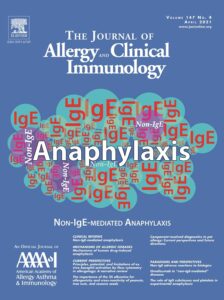Overview
The mission of the institute’s Treatment Pathway is to make impactful discoveries about the immune system in allergy and to translate these discoveries into novel therapies for allergic Canadians.
The Treatment Pathway encompasses the pre-clinical, translational and clinical research arms of the institute. It builds upon the rich history of past immunological research at McMaster on the mechanisms that elicit and perpetuate food allergy. It aims to escalate food allergy research to new heights by using state-of-the-art big data generating technologies (such as single-cell sequencing) and by applying the foremost computational analyses (including machine learning) to these datasets to unveil mechanisms that could not otherwise be found.
The Treatment Pathway investigates associations derived from the Prevention Pathway using pre-clinical experimental systems in animal models and in humans. The rich bench-to-bedside pipeline established by McMaster’s Jordana-Waserman Lab provides a unique opportunity to acquire samples directly from allergic patients for discovery research and allows the foremost mechanistic knowledge to be applied rapidly to allergic patients.
The structure provided by the Schroeder Allergy and Immunology Research Institute’s is enabling McMaster’s award-winning allergy scientists to explore new directions and exploit unanticipated opportunities.
Scientific Progress
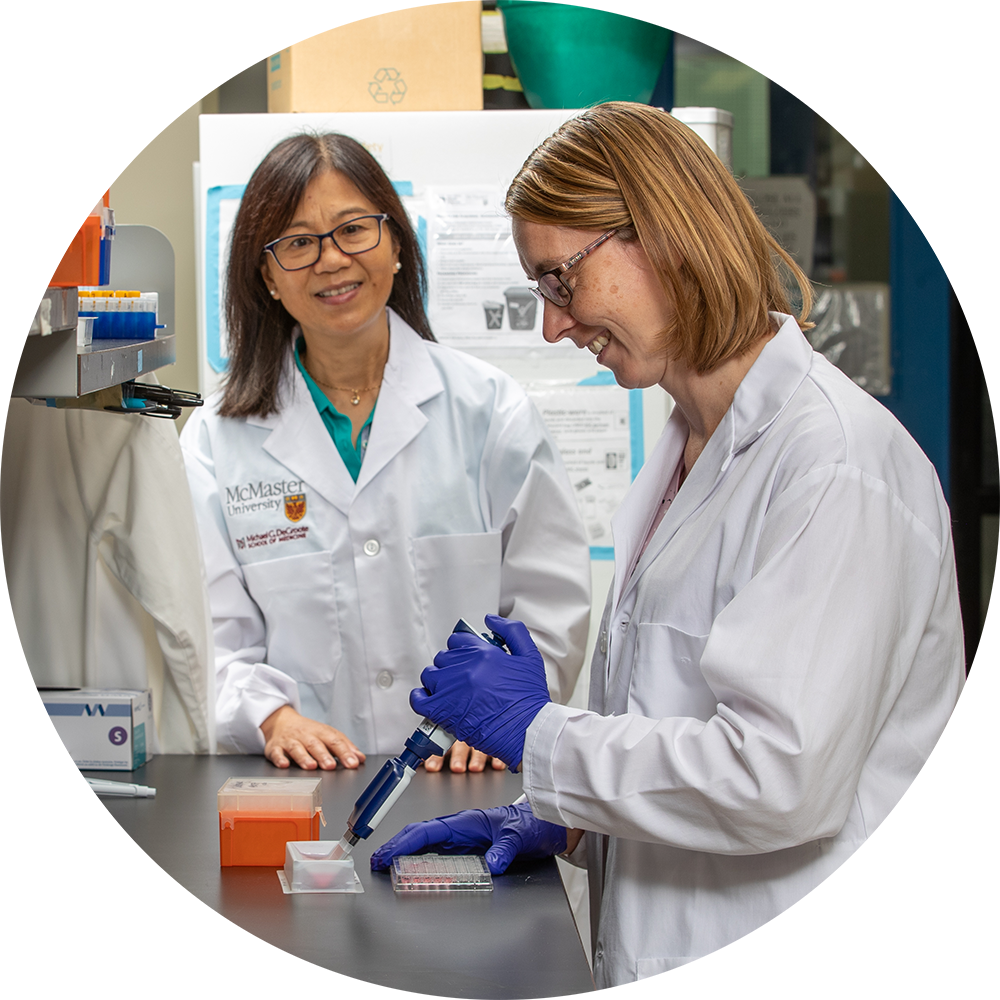
The Treatment Pathway team is developing state-of-the-art technologies and systems that will unravel the complex interactions that make up an immune response to allergens.
Schroeder Allergy and Immunology Research Institute (SAIRI) researchers have identified new therapies and are translating these discoveries into clinical practice. They are also engaged in multiple clinical trials evaluating novel therapeutics with the potential to transform food allergy treatment.
Innovations and activities of the Treatment Pathway
Allergen tetramers are engineered molecules that allow researchers to detect and study extremely rare cells that cause allergy. SAIRI’s are amongst the first researchers to develop an allergen tetramer platform to study peanut-specific cells, which will greatly increase our understanding of peanut allergy. The Treatment Pathway team is expanding this platform to study other allergens such as egg, milk, hazelnut, peach, birch and fungi.
This technology has been of significant interest to pharmaceutical companies. ALK Abello, a Denmark-based international leader in allergen immunotherapies, sought collaboration with SAIRI researchers because of their expertise in studying allergen-specific cells with tetramers. With ALK Abello, institute researchers have generated new tetramer reagents to study birch pollen allergy.
Collaborating with scientists at McMaster University and the Schroeder Allergy and Immunology Research Institute has already provided ALK with new and cutting-edge insights into the mode of action of immunotherapy and other novel treatments of food allergy. Such deep mechanistic understanding of allergic diseases is the first important step in designing effective treatments that can improve the lives of people suffering from food allergy.
– Dr. Peter Sejer Andersen, Senior Director Immunology, ALK Abello
Institute researchers have paired this tetramer technology with big data generating sequencing technology to identify a new type of B cell that causes persistent allergies. This cell type will be the target of future allergy therapeutics, a process already underway at SAIRI. The Treatment Pathway team is in discussion with other pharmaceutical companies who are interested in the tetramer technology to evaluate the effectiveness of their candidate therapies in food allergy.
Institute scientists have also leveraged this tool to support other research at McMaster. For example, the tool was used in a project to generate COVID-tetramer reagents for Canada’s Global Nexus School for Pandemic Prevention & Response, to facilitate the study of antibodies that protect us against COVID. This has advanced the development of next-generation COVID-19 vaccines, delivered via inhaled aerosol rather than injection. Human clinical trials for these vaccines are ongoing.
A report on the technology that generated allergen tetramers to study the immune system has been recently published in the top protocols journal in the world, Nature Protocols.
In collaboration with the U.S. National Institutes of Health, SAIRI researchers have established a microscopy tool that allows them to look at every cell directly in tissues.
Using computational tools, researchers evaluate all of the interactions occurring between every cell in a tissue. This strategy will help them understand the interactions present in allergic conditions that are not present in healthy conditions.
The SAIRI is one of three groups in the world that can perform this industry-disrupting technique and the only group focused on developing the technology to study allergic diseases. The Treatment Pathway team is applying this strategy to study other allergic diseases, starting with understanding how nasal polyps develop, and intend to apply this technology to discover many new therapeutic options in a bench-to-bedside approach.
Institute researchers published a landmark paper in the top journal in allergy, the Journal of Allergy and Clinical Immunology, identifying a novel therapy in food allergy. This discovery was highlighted as one of the most impactful studies in food allergy in 2021.
In Interrupting reactivation of immunologic memory diverts the allergic response and prevents anaphylaxis, researchers demonstrated that anti-IL-4Ra (known as “dupilumab” or “Dupixent”) stopped peanut-specific IgE production from human B cells and therefore stopped allergic reactions from occurring.
This work is moving to the clinic though multiple clinical trials that are using Dupixent in food allergy. Institute researchers have licensed a promising competitor to Dupixent for evaluation of efficacy, with the intention to move into clinical trials.
The Institute is working with industry to test other candidate therapies for efficacy in food allergies. In collaboration with ALK Abello, SAIRI has initiated preclinical studies evaluating sublingual immunotherapy (SLIT) as a therapeutic option. ALK Abello has committed $10 million toward moving into the food allergy space and have announced clinical trials which will be completed within the next two years.
At the same time, SAIRI researchers are at the centre of a Novartis trial on Ligelizumab, a new IgE antibody-targeting therapy that is being tested in food allergy.
A study by Joshua Koenig and Manel Jordana, who discovered a new type of “memory” cell that makes the IgE antibodies that cause allergies—called MBC2—has been published in Science Translational Medicine, a top journal in translational medicine.
SAIRI was the first in the world to make this discovery, which has already impacted others in the field. This is a substantial leap in understanding persistent allergy and providesa tangible target for therapeutic development.
Combining computational biology and immunology techniques, this research discovered the MBC2 cell was found in multiple allergic conditions, including in patients allergic to seasonal pollen allergens, like birch, and food allergens, like peanut. The research was a collaborative effort between SAIRI and ALK-Abelló A/S, a Danish pharmaceutical company that specializes in allergy.
The work was made possible by technological developments spearheaded by SAIRI. The development of allergen tetramer reagents allowed researchers to detect extremely rare memory cells that react to birch and peanut.
The MBC2 discovery was made by generating an enormous, billion-point dataset and using powerful machine learning algorithms to pull out the unique signature of these cells. Two Schroeder Scholars contributed to this work, including Allyssa Phelps, a PhD candidate who graduated in September 2024 and Danielle Della Libera, an ongoing MSc student.
The novel tools developed at SAIRI require significant computational knowledge. Analysis of massive datasets requires a unique skill set with knowledge of how to develop new Artificial Intelligence-driven strategies to maximize learning from those data.
SAIRI has partnered with the MacDATA Institute, the driver of computational research at McMaster University. Drs. Paul McNicholas (director) and Antoine Deza (assistant director) have joined SAIRI as associate members and will provide the computational support necessary to support the mandate of the institute, especially around analyzing data generated by the complex microscopy tools being employed.
These microscopy tools require the best microscopes and support available. To this end, SAIRI has established a strategic partnership with the new Centre for Advanced Light Microscopy (CALM). The microscopes, expertise and analysis techniques afforded by CALM will provide necessary infrastructure to continue expanding state-of-the-art microscopy techniques. Dr. Jose Moran-Mirabal, the director of CALM, has joined SAIRI as an associate member.
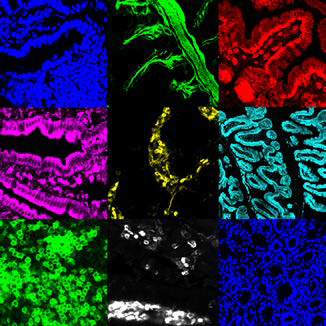
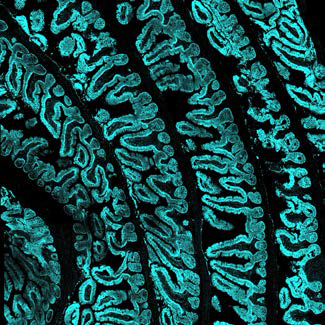
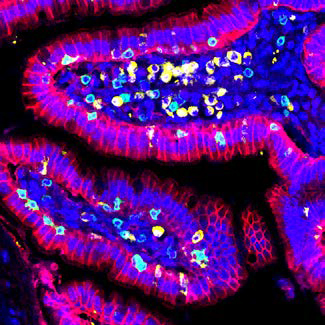 Images of intestines captured by CALM microscopes
Images of intestines captured by CALM microscopes
At the Centre for Advanced Light Microscopy, we are committed to providing SAIRI researchers access to leading-edge instrumentation and world-renowned expertise in microscopy and image analysis techniques. I believe our partnership will result in innovative microscopy workflows widely applicable to the study of allergies, infectious diseases, human health and aging.
– Dr. Jose Moran-Mirabal, Director of CALM
Together, the three-way partnership between the SAIRI, the MacDATA Institute and CALM provides unique infrastructure to ensure the best technologies and analysis tools are applied to allergy research, driving innovation toward development of transformative therapies for food allergy and beyond.
Community Engagement
 A successful allergy institute can only exist when embedded within the community.
A successful allergy institute can only exist when embedded within the community.
Schroeder Allergy and Immunology Research Institute (SAIRI) seeks to perform research that is valued by the Canadian allergy community and to ensure that discoveries are conveyed back to the individuals and organizations who will benefit from them most.
Community engagement in the Treatment Pathway
SAIRI counts on many food-allergic Canadians who provide blood for the experimental allergen immunotherapies study.
I’m helping [SAIRI trainee] Allyssa [Phelps] and Dr. Waserman find a cure for food allergies by giving my blood.
– Aubrey Chinn
Dr. Waserman and her team have made a huge difference for us. We feel confident that Aubrey will be well cared for if an allergic reaction happens. However, we can never feel fully safe until there are better therapies for peanut allergy or even a cure. That is why we donate blood for research whenever possible – to help the institute understand allergies and find better options.
– Liana Chinn, Aubrey’s mom
.
Through various ongoing activities, SAIRI is expanding upon the long-term collaboration between Food Allergy Canada, a non-profit organization dedicated to helping Canadians with food allergies live with confidence, and the Jordana-Waserman lab:
- Research summaries: The institute established an initiative wherein SAIRI trainees provide lay summaries of cutting-edge allergy research to be published in the Food Allergy Canada newsletter. The first summary discussed the limitations of probiotic-supplemented oral immunotherapy and was published online in June 2022.
- Food allergen labeling: The institute is working with Food Allergy Canada and Health Canada to develop a threshold-based approach for precautionary food allergen labelling, with the intent of increasing food safety for food allergic Canadians.
- National strategy: The institute is working with Food Allergy Canada to develop a National Food Allergy Strategy and lobby government for funding to advance prevention, diagnosis and treatment of food allergy.
- Infant formula guidelines: The institute is working with Food Allergy Canada to develop guidelines to manage the infant formula shortage.
- Educational podcasts: The institute is working with Food Allergy Canada to develop podcasts and a forum for the education of food allergic Canadians.
- Public outreach: Institute members participate as experts in Food Allergy Canada’s annual research day, where new research developments are shared with the community.


